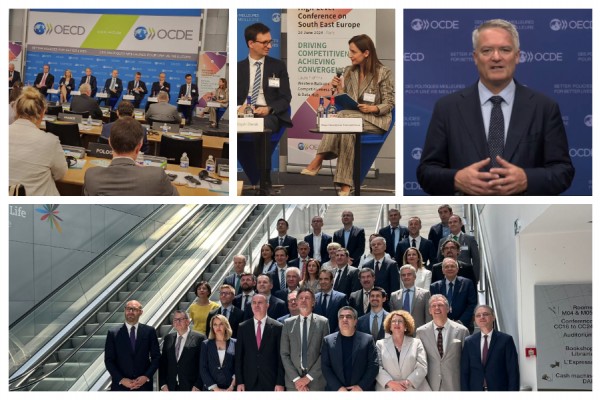
HANDJISKA-TRENDAFILOVA at OECD High-Level Conference on SEE: Challenges Extend Beyond Technology - Governance Standards, Public Administration Quality, Institutional Strength, and Policymaking are Crucial
26 June 2024, Paris, France
The OECD High-Level Conference on South East Europe, titled “Driving Competitiveness, Achieving Convergence,” brought together high-ranking officials from the OECD, European Commission (EC), European Bank for Reconstruction and Development (EBRD), and numerous ministers, deputy prime ministers, and state secretaries from EU and SEE countries who explored strategies for facilitating the socio-economic convergence of the SEE region towards the EU and OECD standards.
Mathias CORMANN, Secretary-General of the OECD, emphasized the importance of the Western Balkans Competitiveness Outlook 2024 and the WB Competitiveness Data Hub in supporting regional growth by enabling policymakers to assess and benchmark economic policies. He highlighted the OECD's role in fostering collaboration and learning among the Western Balkans.
The opening session was moderated by Prof. George PAGOULATOS, Ambassador and Permanent Representative to the OECD, and Chair of the Friends of South East Europe. This session featured insights from Péter SZIJJÁRTÓ, Minister of Foreign Affairs and Trade; Zdenko LUCIĆ, State Secretary for Foreign Trade and Development Cooperation; Mathieu BOUSQUET, Director at the EC Directorate General for Neighbourhood and Enlargement Negotiations (NEAR); Majlinda BREGU, Secretary General of the Regional Cooperation Council (RCC) and Carlo MONTICELLI, Governor of the Council of Europe Development Bank, who discussed various strategies to enhance competitiveness in the Western Balkans.
Through two Ministerial panels, they discussed critical priorities and collaborated on overcoming future challenges affecting the SEE region:
THE FIRST MINISTERIAL PANEL “Pathways for smart convergence to boost competitiveness”, moderated by Gerhard JANDL, Ambassador, Permanent Representative to the OECD provided an opportunity for ReSPA Director Maja HANDJISKA-TRENDAFILOVA, Nik GJELOSHAJ, Deputy Prime Minister and Minister of Economic Development, Sandra DOKIĆ, State Secretary of the Ministry of Environmental Protection, Luca NICULESCU, Secretary of State, Ministry of Foreign Affairs, René TROCCAZ, Special Envoy for the Western Balkans, Ministry of Europe and Foreign Affairs, George CHRISTOPOULOS, Secretary General of the Finance and Economy Ministry, Slobodan ŠEŠUM, Director-General, Directorate for Economic and Public Diplomacy, Ministry of Foreign and European Affairs and Christoph DENK, Managing Director for Policy, Strategy and Delivery, European Bank for Reconstruction and Development (EBRD) to explore policy pathways for stimulating economic growth by leveraging technology and its adoption by governments, businesses, and citizens across the region.
Director HANDJISKA-TRENDAFILOVA underlined the significance of strong institutions and empowered human capacities in the public sector to shoulder all growth-enhancing reforms and the need for boosting digital competencies while harnessing digital transformation potentials: “Challenges are not just technology-related. A great deal has to do with the governance standards, quality of public administration, the strength of institutions, and sound and evidence-informed policymaking. All in our remits must assist with deploying concrete support on the ground. The OECD does this brilliantly via deep scans, data and evidence-informed policy advice and benchmarking. ReSPA has an important role to play in building public sector skillsets and digital competencies, but also agile and innovation mindsets in the public administration”. The director outlined some of ReSPA’s support actions in the area, including the flagship Western Balkans Public Administration Award, digitization seasonal schools, interoperability academies, intense work on open data and cyber-resilience, contribution to several digitization and governance strategies, as well as concrete support to digitize various HRMD processes and learning management systems throughout the region.
THE SECOND MINISTERIAL PANEL “Sustainability as a driver for economic growth” moderated by Christina KOKKINAKIS, Ambassador and Permanent Representative to the OECD, UNESCO and the Principalities of Andorra and Monaco enabled discussion between Rozeta HAJDARI, Minister of Industry, Entrepreneurship and Trade, Blendi GONXHJA, Minister of Economy, Culture and Innovation, Manuel SARRAZIN, Special Representative for the Western Balkans, Jakub WIŚNIEWSKI, Deputy Minister of Foreign Affairs, Colleen HYLAND, Acting Deputy Assistant Secretary, Matteo RIVELLINI, Head of Division, Western Balkans and Türkiye, European Investment Bank (EIB), Pranvera KASTRATI, Head of Programme Department, RCC, Matej ZAKONJŠEK, Director, Transport Community Permanent Secretariat on systematic efforts towards sustainably increasing the well-being of citizens.
Since 2000, the OECD South East Europe Regional Programme (SEERP) has been closely collaborating with economies of the region to foster growth, investment and employment through reforms that support competitiveness and private sector development. The Programme addresses regional and national needs, capacities and reform priorities while translating OECD standards and good practices into actionable recommendations for the Western Balkan economies.
The fourth edition of the Western Balkans Competitiveness Outlook 2024, alongside the related Western Balkans Competitiveness Data Hub will, for the first time, present the results on an interactive online platform complementing the report. The Data Hub will enable policymakers to easily assess and benchmark economic policy, ultimately facilitating policies that drive competitiveness and further convergence efforts.



